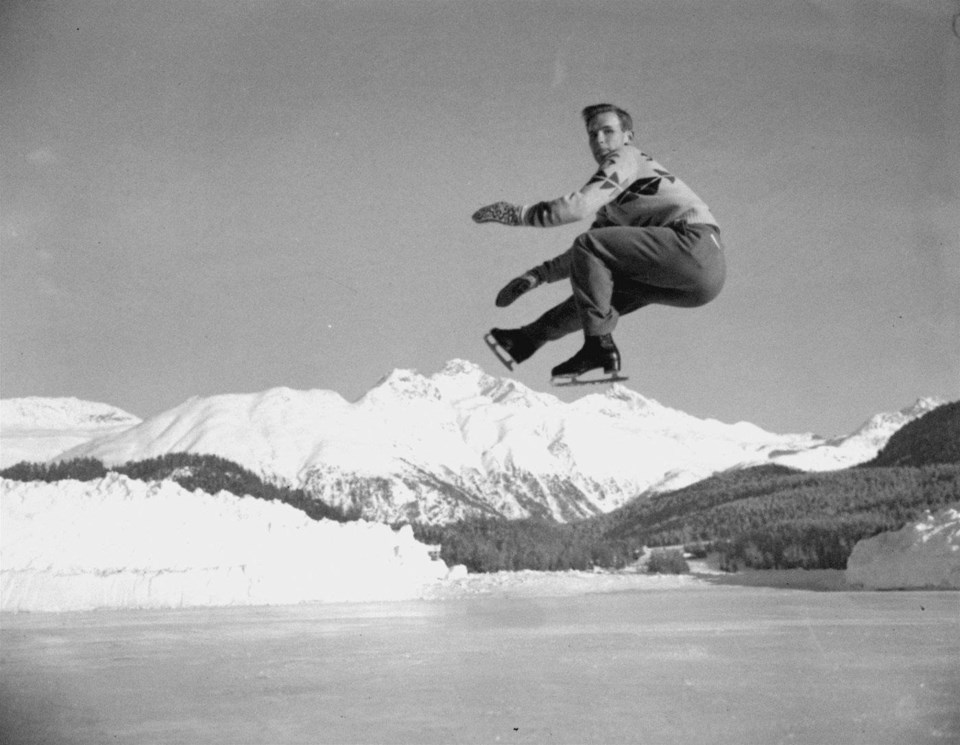NEW YORK (AP) ā Dick Button was more than the most accomplished menās figure skater in history. He was one of his sportās greatest innovators and promoters.
Button, winner of two Olympic gold medals and five consecutive world championships, died Thursday, said his son, Edward, who did not provide a cause. He was 95.
As an entrepreneur and broadcaster, Button promoted skating and its athletes, transforming a niche sport into the showpiece of every Winter Olympics.
āDick was one of the most important figures in our sport,ā Scott Hamilton said. āThere wasnāt a skater after Dick who wasnāt helped by him in some way.ā
Buttonās impact began after World War II. He was the first U.S. menās champion ā and his countryās youngest at age 16 ā when that competition returned in 1946. Two years later, he took the title at the St. Moritz Olympics, competing outdoors. He performed the first double axel in any competition and became the first American to win the menās event.
āBy the way, that jump had a cheat on it,ā Button told the U.S. Olympic Committee website. āBut listen, I did it and that was what counted.ā
That began his dominance of international skating, and U.S. amateur sports. He was the first figure skater to win the prestigious Sullivan Award in 1949 ā no other figure skater won it until Michelle Kwan in 2001.
In 1952, while a Harvard student, he won a second gold at the Oslo Games, making more history with the first triple jump (a loop) in competition. Soon after, he won a fifth world title, then gave up his eligibility as an amateur. All Olympic sports were subject to an amateur/professional division at the time.
āI had achieved everything I could have dreamed of doing as a skater,ā said Button, who earned a law degree from Harvard in 1956. āI was able to enjoy the Ice Capades (show) and keep my hand in skating, and that was very important to me.ā
With the Emmy Award-winning Button as the TV analyst, viewers got to learn not only the basics but the nuances of a sport foreign to many as he frankly broke down the performances. He became as much a fixture on ABCās āWide World of Sportsā as Jim McKay and the hapless ski jumper tumbling down the slope.
āDick Button is the custodian of the history of figure skating and its quintessential voice,ā 1988 Olympic champion Brian Boitano said in Buttonās autobiography. āHe made the words ālutzā and āsalchowā part of our everyday vocabulary.ā
After a 1961 plane crash killed the entire U.S. figure skating team on the way to the world championships, which then were canceled, Button persuaded ABC Sports executive Roone Arledge to televise the 1962 event on āWide World.ā Thatās when he joined the network as a commentator.
Buttonās death coincided with another tragedy in the skating world, Wednesday nightās crash of an that collided with an Army helicopter and plummeted into the Potomac River outside Washington, D.C., killing everyone on board. Two teenage figure skaters, their mothers, and two former world champions who were coaching at the Skating Club of Boston were among .
Button skated for the Boston club and remained close to it for the rest of his life. The trophy room at the club is named in his honor.
He also provided opportunities for skaters to make money after their competitive careers. He ran professional events he created for TV for years, attracting many top names in the sport ā Hamilton, Torvill and Dean, Kristi Yamaguchi, Kurt Browning and Katarina Witt.
Buttonās Candid Productions, formed 1959, also produced such made-for-TV programs as āBattle of the Network Stars.ā He also dabbled in acting, but the rink was his realm.
āDick Button created an open and honest space in figure skating broadcasting where no topic or moment was off-limits,ā said Johnny Weir, the three-time U.S. champion and current NBC Sports figure skating analyst. āHe told it like it was, even when his opinion wasnāt a popular one. His zingers were always in my mind when I would perform for him, and I wanted to make him as happy and proud as I would my coaches.
āI think that is something very special about commentating figure skating. As an athlete, we rarely have an opportunity to speak, and we rely on the TV voices to tell our story for us. Nobody could do it like Mr. Button.ā
Barry Wilner, The Associated Press


